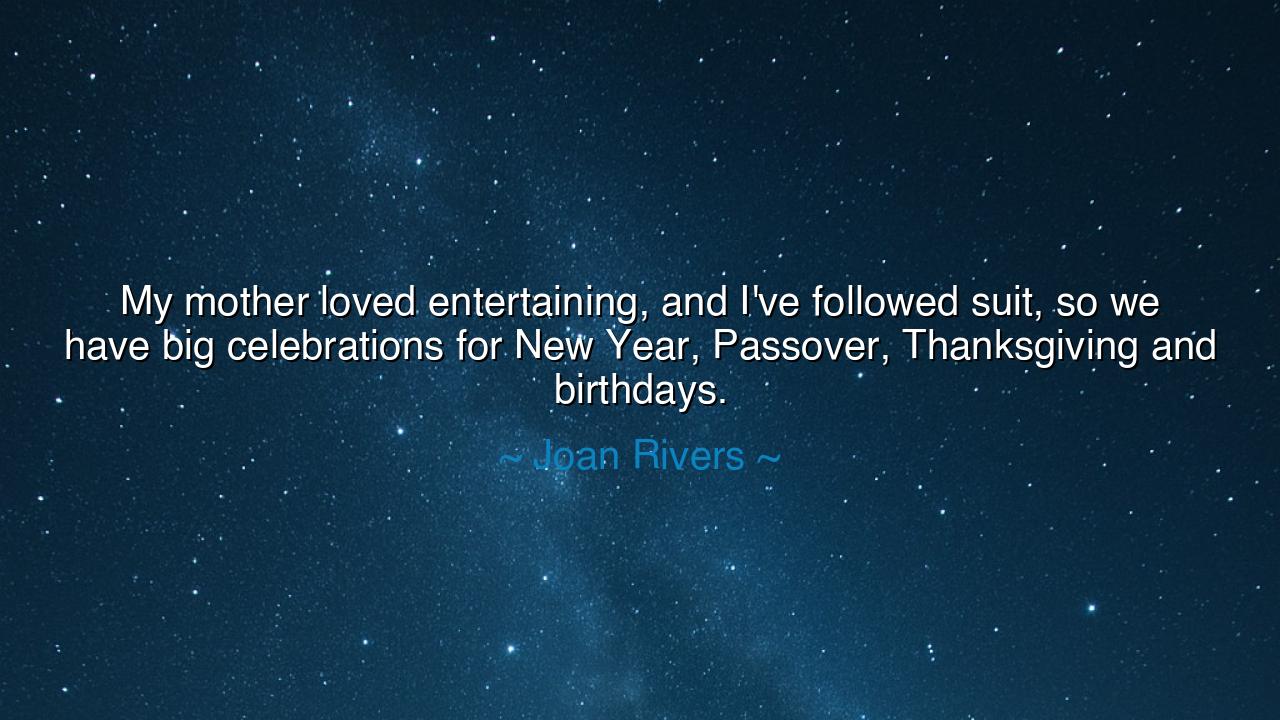
My mother loved entertaining, and I've followed suit, so we have
My mother loved entertaining, and I've followed suit, so we have big celebrations for New Year, Passover, Thanksgiving and birthdays.






Joan Rivers, with her sharp wit and keen sense of legacy, once confessed: “My mother loved entertaining, and I've followed suit, so we have big celebrations for New Year, Passover, Thanksgiving and birthdays.” In these words, hidden beneath the sparkle of humor, lies a truth of deep and enduring weight: that the love of gathering is not merely personal taste, but a heritage, passed like a torch from parent to child. Her reflection reminds us that the feasts we prepare, the tables we set, and the laughter we cultivate are not trivial—they are the weaving together of memory, tradition, and belonging.
The origin of this truth lies in the nature of family itself. Rivers’ mother loved to entertain, to open her home as a place where people could be nourished not only by food but by connection. In doing so, she planted in her daughter the seeds of hospitality. When Rivers speaks of continuing the tradition—celebrating New Year, Passover, Thanksgiving, and birthdays—she acknowledges that every generation either preserves or neglects the rituals it inherits. Her choice to continue her mother’s ways is not only a tribute to her family, but an act of reverence for the binding power of shared celebration.
History offers many mirrors of this same truth. Consider the ancient Jewish tradition of the Passover Seder, where each generation sits at the table not merely to eat, but to remember the deliverance of their ancestors from Egypt. It is an act of ritual storytelling, designed to ensure that no child forgets where they come from. Or think of the medieval banquets of kings and nobles, which were not merely indulgences, but symbols of loyalty, unity, and shared strength. In both humble homes and great halls, the act of gathering for celebration has always been a way of affirming identity and community.
Rivers also reveals the universality of celebration. She names holidays from different roots—religious feasts like Passover, cultural observances like Thanksgiving, and personal milestones like birthdays. This blend of traditions illustrates the richness of modern identity: we are not confined to a single ritual, but carry within us multiple layers of heritage. To honor them all is to embrace the fullness of life, to affirm that joy is not bound to one calendar but woven throughout the year.
The deeper meaning of her reflection lies in the power of continuity. Her mother’s love of entertaining became her own, and through her, it passed to future generations. In every dish prepared, every guest welcomed, every toast raised, the spirit of her mother still lived. This is the sacred truth of family traditions: they allow the dead to live on, not only in memory, but in action. Each feast becomes a bridge across time, connecting past, present, and future in one living chain.
The lesson for future generations is this: do not neglect the rituals of celebration. For it is in these moments of gathering that families are bound, stories are told, and identities are preserved. Children who grow up around such tables carry within them a compass, a sense of belonging that steadies them through the storms of life. To abandon these rituals is to risk forgetting who we are. To preserve them is to gift our descendants a treasury richer than gold.
Practical wisdom flows from Rivers’ words. Learn to host with love, whether your table is grand or humble. Do not wait for perfect circumstances to celebrate—rejoice in the birthdays, the holidays, the small milestones, for they are the threads that weave strong bonds. Welcome others into your home, not with extravagance, but with warmth. And teach your children the joy of gathering, so that when your voice is gone, they too will keep the traditions alive.
Thus, Joan Rivers’ memory of her mother becomes more than a family anecdote—it is a parable for all who hear. Celebration, rooted in heritage, is not frivolous but sacred. It carries love from one generation to the next, ensuring that even as time passes, the spirit of family endures. Let us therefore honor the rituals of gathering, for in them, we keep alive both the memory of those who came before us and the hope of those who will follow after.






AAdministratorAdministrator
Welcome, honored guests. Please leave a comment, we will respond soon